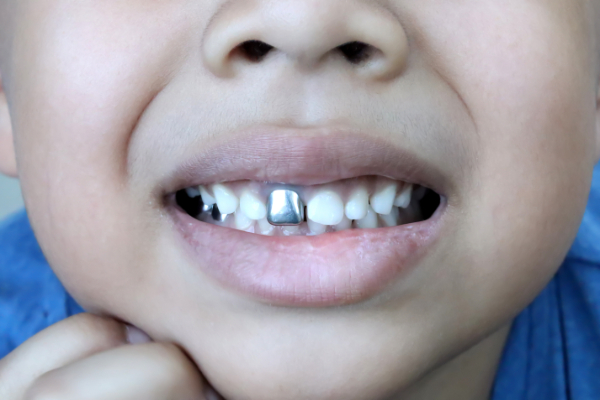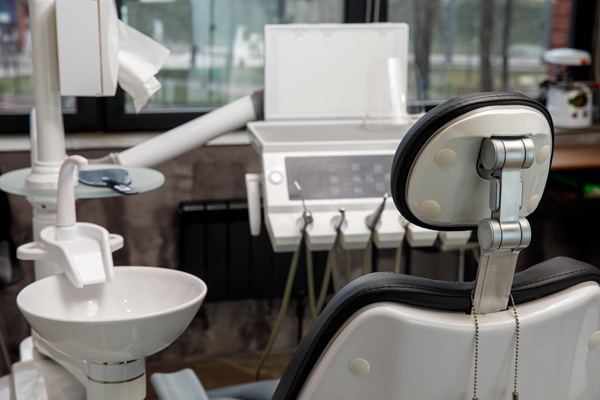Different Types of Kids Dental Crowns

Kids dental crowns are typically used to prevent baby teeth from falling out prematurely. While there is a common misconception that baby teeth are not important since they serve a temporary role, that could not be further from the truth. Baby teeth play a crucial role, holding space for the permanent teeth behind them. There is a good chance a permanent tooth with erupt in a problematic way when the baby tooth that once held its spot on the jaw falls out before it is ready to erupt.
Five main types of kids dental crowns are popular with pediatric dentists: polycarbonate, composite strip, stainless steel, zirconia ceramic, and resin-veneered. Each type of crown has its pros and cons, so factors like the location it will be placed, any allergies the child has, and aesthetics typically dictate the type of crown recommended.
The five most popular types of kids dental crowns
Let us take a closer look at the different types of crowns pediatric dentists typically recommend for children:
1. Zirconia ceramic
These crowns are made with zirconium oxide after it has been stabilized with yttrium oxide. They sometimes have layers of porcelain on their outer surface or substructure. These are one of the most durable types of crowns and one of the pricier options.
Reasons to consider choosing zirconia ceramic crowns over the other types include excellent durability, a natural look, biocompatibility, and plaque resistance. These crowns do not contain any metal components. The drawbacks of zirconia ceramic crowns include taking longer to place, not being contourable, and being pricier than other types of crowns.
2. Resin veneer crowns
These are stainless steel crowns that are covered with white facings to improve their aesthetics. They combine the natural aesthetics of resin facings with the durability of stainless steel. Placing these crowns typically requires a larger portion of the tooth being treated to be removed to create an ideal fit with the crown.
Some of the benefits of resin veneer crowns include great aesthetics, excellent durability, and moisture resistance. Some of their disadvantages include being one of the pricier types of crowns, requiring larger portions of enamel to be removed during installation, and being more likely to trigger allergies.
3. Composite strip crowns
These are made by hardening a composite that is made from mixtures of glass and plastic. These composites provide excellent aesthetics since they can be color-matched with the patient’s teeth. However, they are more prone to fracture and breakage than other types of crowns. Composite strip crowns provide believable exteriors and are moderately priced. However, they do not last as long as other types of crowns.
4. Stainless steel crowns
Pediatric dentists have used stainless steel crowns for almost a century. These crowns are made from a blend of chromium, carbon, iron, and other metals. Stainless steel crowns are extremely durable, but they stick out due to their color. They are primarily used to protect teeth in the back of the mouth that are not easily visible.
Stainless steel crowns are highly durable, low cost, retentive, and easy to contour. However, the metals in them might trigger allergies, and they provide poor aesthetics.
5. Polycarbonate crowns
These types of crowns are made from polycarbonate resin shells or acrylic. They are cemented into place with an adhesive resin and provide a low-cost crown that can be matched with the color of the child’s teeth.
Polycarbonate crowns are one of the most affordable types of crowns and provide excellent aesthetics. However, they are more sensitive to moisture than other types of crowns and take longer to place.
Get your child the right type of crown
Our pediatric dentist will help you determine the best type of crown for your child’s needs. Call or visit our Concord clinic to set up an appointment.
Request an appointment here: https://parksidepediatricdentists.com or call Parkside Pediatric Dentists at (925) 504-4011 for an appointment in our Concord office.
Check out what others are saying about our services on Yelp: Read our Yelp reviews.
Related Posts
Finding a good kids special needs dentist is crucial, as it determines how well the child's dental experience will go. When it comes to a child with special needs, there is extra care and patience involved, which is why it is so important to find a good fitting dentist. Thankfully, there are a few things…
An infant frenectomy can help babies who have discomfort or difficulty feeding due to issues with the frenulum, small pieces of tissue connecting the upper lip to the gums, and the bottom of the tongue to the mouth's floor. If the frenulum is too tight, it may limit movement and cause feeding problems. Understanding what…
A pediatric dentist works with your child to treat their condition and teach them the importance of oral health from a young age. Misalignment and malocclusions are quite common in children and adolescents as their teeth develop. There are several reasons a child might require braces. Treating these conditions early on can help guide their…
Caring for kids' teeth is essential for their health and speech development. When a tooth becomes damaged, kids' dental crowns can help restore its function and protect it from further harm. In the past, dentists commonly used metal crowns for kids, but advancements in dentistry have introduced metal-free options. These modern crowns provide a natural…


